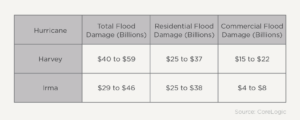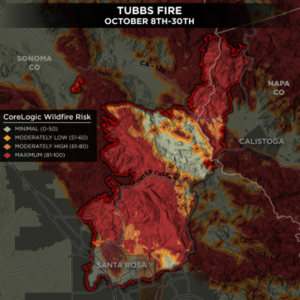This article is part of a sponsored series by Cotality.
Annual Natural Hazard Risk Summary and Analysis Details 2017 Natural Hazard Events
CoreLogic® analyzes and evaluates the number and severity of natural hazard events that occur across the U.S. in its Natural Hazard Risk Summary and Analysis in order to help inform and protect homeowners and businesses from financial catastrophe. The annual report reviews hazard activity for flooding, earthquake, wildfire, wind, hail, tornado and hurricanes, with spotlights on specific international events.
The CoreLogic data shows relatively average activity for most U.S. natural hazards in 2017 with the exception of wildfires in California and flooding as a result of Hurricanes Harvey and Irma. A snapshot of the data includes:
Flood
In the past year, flooding from Hurricanes Harvey and Irma resulted in an estimated $69 billion to $105 billion in residential and commercial damage. The breakdown of residential and commercial damage can be seen below:

The majority of flood damage resulting from the two storms was uninsured—at 75 percent uninsured from Harvey and 80 percent uninsured from Irma.
California and the Midwest also experienced significant rainfall that resulted in flooding. According to the National Centers for Environmental Information (NCEI), total property loss from the California winter floods is estimated at $1.5 billion and total property loss from the Midwest (between Oklahoma and Ohio) April/May flooding is estimated at $1.7 billion.
Atlantic Hurricanes
Overall, Hurricane activity in the Atlantic was higher than average in 2017 with 17 named storms, 10 hurricanes and six major hurricanes, which are identified as Category 3 or greater.
Hurricane Harvey, a Category 4 storm that made landfall in Texas, caused an estimated $1 billion to $2 billion in insured wind and storm surge loss to both residential and commercial properties. Hurricane Irma, a Category 4 storm that made landfall in South Florida, caused an estimated $14 billion to $19 billion in insured wind and storm surge loss to both residential and commercial properties.
Wildfire
Similarly, 2017 was a landmark year for wildfire in the U.S. The total number of acres burned (9,791,062 acres) is the third highest in U.S. history, preceded by 2015 (10,125,149 acres) and 2006 (9,873,745 acres).
The 10 most destructive wildfires in 2017, in terms of structures destroyed, were in California and include:

- The Tubbs Fire in northern California which burned 36,807 acres and 5,643 structures
- Until the Tubbs Fire, the two worst wildfires in California history – Tunnel in 1991 and Cedar in 2003 – destroyed 5,720 structures combined
- The Nuns Fire in northern California which burned 54,382 acres and 1,355 structures
- The Thomas Fire in southern California which burned 281,893 acres and 1,063 structures
- The Atlas Fire in northern California which burned 51,624 acres and 781 structures
- The Redwood Valley Fire in southern California which burned 36,523 acres and 544 structures
- The Cascade Fire in northern California which burned 9,989 acres and 398 structures
- The Lilac Fire in southern California which burned 4,100 acres and 157 structures
- The Detwiler Fire in Mariposa County, California which burned 81,826 acres and 131 structures
- The Creek Fire in southern California which burned 15,619 acres and 123 structures
- The Helena Fire in Trinity County, California which burned 21,846 acres and 123 structures
To learn more about the various perils that impacted the U.S. in 2017, view the full report here.
Topics Catastrophe USA Natural Disasters California Wildfire Flood Hurricane
Was this article valuable?
Here are more articles you may enjoy.




 Beazley Agrees to Zurich’s Sweetened £8 Billion Takeover Bid
Beazley Agrees to Zurich’s Sweetened £8 Billion Takeover Bid  Winter Storm Fern to Cause Up to $6.7B in Insured Losses
Winter Storm Fern to Cause Up to $6.7B in Insured Losses  Florida’s Commercial Clearinghouse Bill Stirring Up Concerns for Brokers, Regulators
Florida’s Commercial Clearinghouse Bill Stirring Up Concerns for Brokers, Regulators  Q4 Global Commercial Insurance Rates Drop 4%, in 6th Quarterly Decline: Marsh
Q4 Global Commercial Insurance Rates Drop 4%, in 6th Quarterly Decline: Marsh 

